Document Author
Year Published
- 2015 (5) Apply 2015 filter
- 2012 (3) Apply 2012 filter
- 2000 (2) Apply 2000 filter
- 2002 (2) Apply 2002 filter
- 2004 (2) Apply 2004 filter
- 2005 (2) Apply 2005 filter
- 2013 (2) Apply 2013 filter
- 2017 (2) Apply 2017 filter
- 2007 (1) Apply 2007 filter
- 2008 (1) Apply 2008 filter
- 2009 (1) Apply 2009 filter
- 2018 (1) Apply 2018 filter
Topic
- (-) Remove Plain Language filter Plain Language
- Plain Language & LEP (27) Apply Plain Language & LEP filter
- Forms (10) Apply Forms filter
- 100% Access to Justice (9) Apply 100% Access to Justice filter
- Forms (8) Apply Forms filter
- Self-Help Centers (5) Apply Self-Help Centers filter
- Simplification (5) Apply Simplification filter
- Trial Court Self-Help (5) Apply Trial Court Self-Help filter
- Best Practices for Self-Help Centers (4) Apply Best Practices for Self-Help Centers filter
- LEP and Access (4) Apply LEP and Access filter
- Reports, Evaluations, Best Practices, Surveys (4) Apply Reports, Evaluations, Best Practices, Surveys filter
- Research (4) Apply Research filter
- Strategic Planning (4) Apply Strategic Planning filter
- Technology (4) Apply Technology filter
- Courts (3) Apply Courts filter
- Articles & SRLN Briefs (2) Apply Articles & SRLN Briefs filter
- Best Practices (2) Apply Best Practices filter
- Consumer Adoption (2) Apply Consumer Adoption filter
- Ethics Education (2) Apply Ethics Education filter
- Justice Tech Entrepreneurs (2) Apply Justice Tech Entrepreneurs filter
- Presentations (2) Apply Presentations filter
- Working Groups (2) Apply Working Groups filter
- ATJ Commissions (1) Apply ATJ Commissions filter
- Automated Forms & E-Filing (1) Apply Automated Forms & E-Filing filter
- Clerk, Self-Help Center Staff, and Librarian Ethics (1) Apply Clerk, Self-Help Center Staff, and Librarian Ethics filter
- Conferences & Summits (1) Apply Conferences & Summits filter
- Evaluation (1) Apply Evaluation filter
- Judicial Ethics (1) Apply Judicial Ethics filter
- Legal Aid (1) Apply Legal Aid filter
- Libraries (1) Apply Libraries filter
- Map Gallery (1) Apply Map Gallery filter
- Reports (1) Apply Reports filter
- State-by-State (1) Apply State-by-State filter
- State Language Access Plans (1) Apply State Language Access Plans filter
- Trainer of the Trainer Materials / Curricula (1) Apply Trainer of the Trainer Materials / Curricula filter
- Triage (1) Apply Triage filter
- Unbundling (1) Apply Unbundling filter
- Webinars (1) Apply Webinars filter
State
Region
Tags
Post date
Search results
Research: Principles of Readability (DuBay 2004)
This research gives a brief introduction to the literacy studies in the U.S. and the research on readability and the readability formulas. It is available at http://www.impact-information.com/impactinfo/readability02.pdf Plain Language United States ...
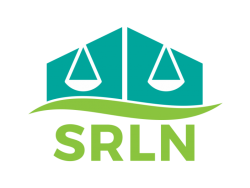
SRLN Brief: Plain Language Resources for 100% Access (SRLN 2015)
What is plain language? As described by the federal government on plainlanguage.gov, plain language is communication your audience can understand the first time they read or hear it. Plain language is recognized as an essential best practice in all access ...
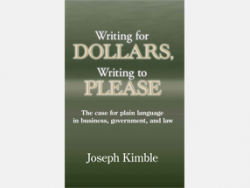
Book: Writing for Dollars, Writing to Please The Case for Plain Language in Business, Government, and Law (Kimble 2012)
This book collects the empirical evidence supporting the value of plain language in business, government, and law. Professor Kimble summarizes 50 studies (no less) that show using plain language can save organizations and agencies a significant amount of ...
Handbook: Write For Your Reader (NWT Literacy Council 2015)
This is an easy-to-use 'how to' manual for people who write or edit reports, memos, minutes, brochures, or other documents. Recommended Citation: NWT Literacy Council, A Plain Language Handbook: Write for your Reader, Department of Education, ...
Resource: Scribes Journal of Legal Writing (American Society of Legal Writers)
The Scribes Journal of Legal Writing is a a scholarly journal which publishes articles about legal writing. It has published articles by many of the best-known figures in legal writing — including Garner, Kimble, Charles Alan Wright, Richard Posner, Lawre ...
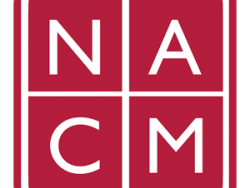
Webinar: How to Incorporate Plain Language into Court Forms, Websites, and Other Materials (NACM 2017)
The National Association for Court Management (nacmnet.org), in partnership with the Self-represented Litigation Network (SRLN), invites you to participate in its third webinar of 2017 on November 29, 2017 at 2:00 p.m. EST. Plain language is recognized ...
Handbook: Plain Language (Lauchman 2009)
This handbook is intended for the writers in the U.S. federal government. It focuses on aspects of writing that are especially important to Plain Language. The Lauchman Group (lauchmangroup.com) regularly updates the handbook on their website. Recommend ...
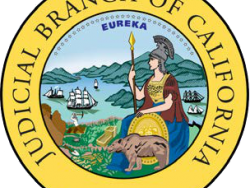
Weblinks: Efficiencies and Innovation in California (Judicial Branch of California 2015)
On its webpage entitled, Efficiencies & Innovations (courts.ca.gov), the The California judicial branch, which is widely acknowledged as a national leader in developing and implementing programs that enhance access to justice, provides information and ...
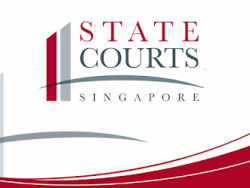
Weblinks: Simplification in Singapore (State Court of Singapore 2015)
Transparent information that seeks user feedback from the State Courts of Singapore about what a simplified court process means for SRLs in criminal, SRLs in civil, lawyers and others that can be found on the Singapore State Court's Key Features of t ...
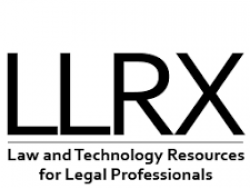
Article: Plain Language in Law (Dave 2002)
Plain Language in Law, by Sandeep Dave cites several resources about using plain language in legal documents. It can be found at https://www.llrx.com/2002/11/features-plain-language-in-law/. Plain Language United States Sandeep Dave 2002 ...